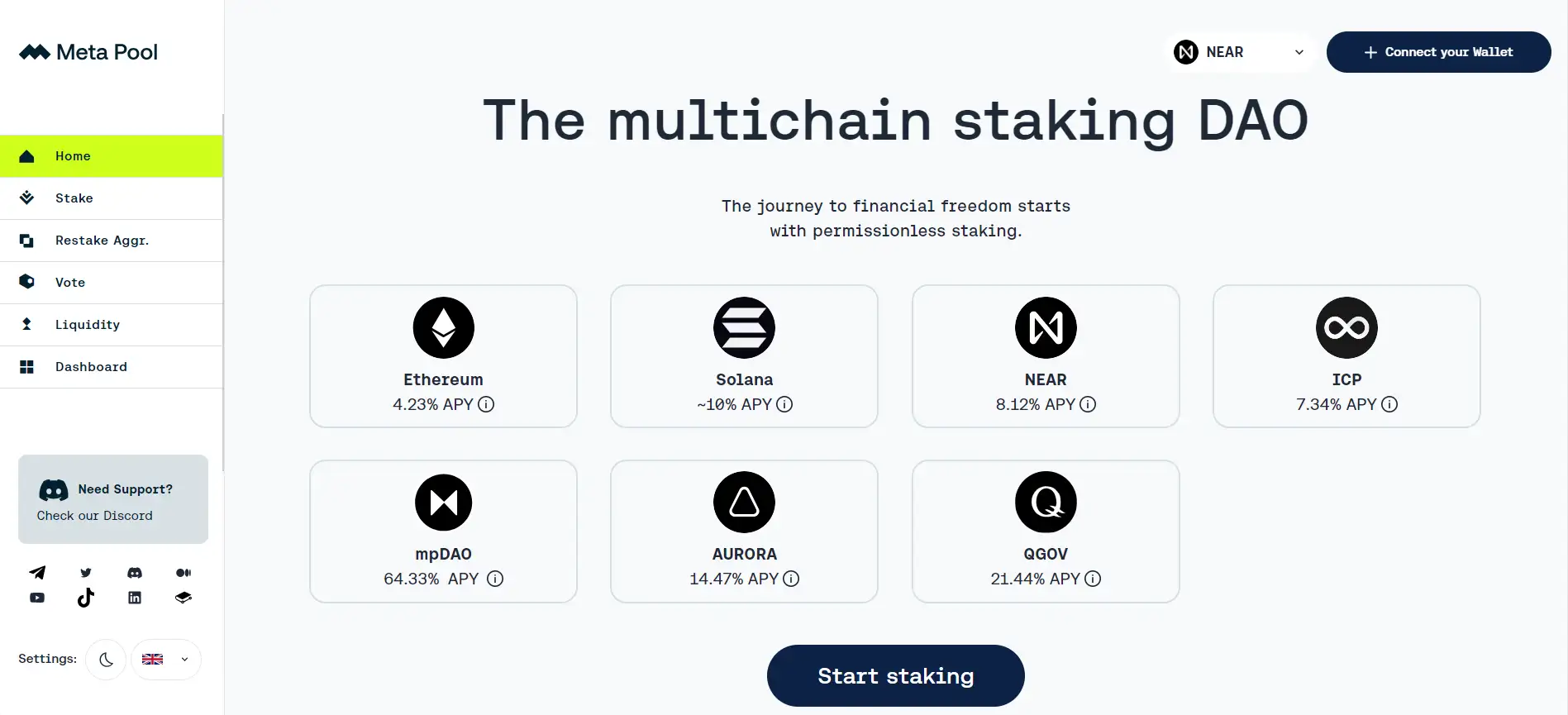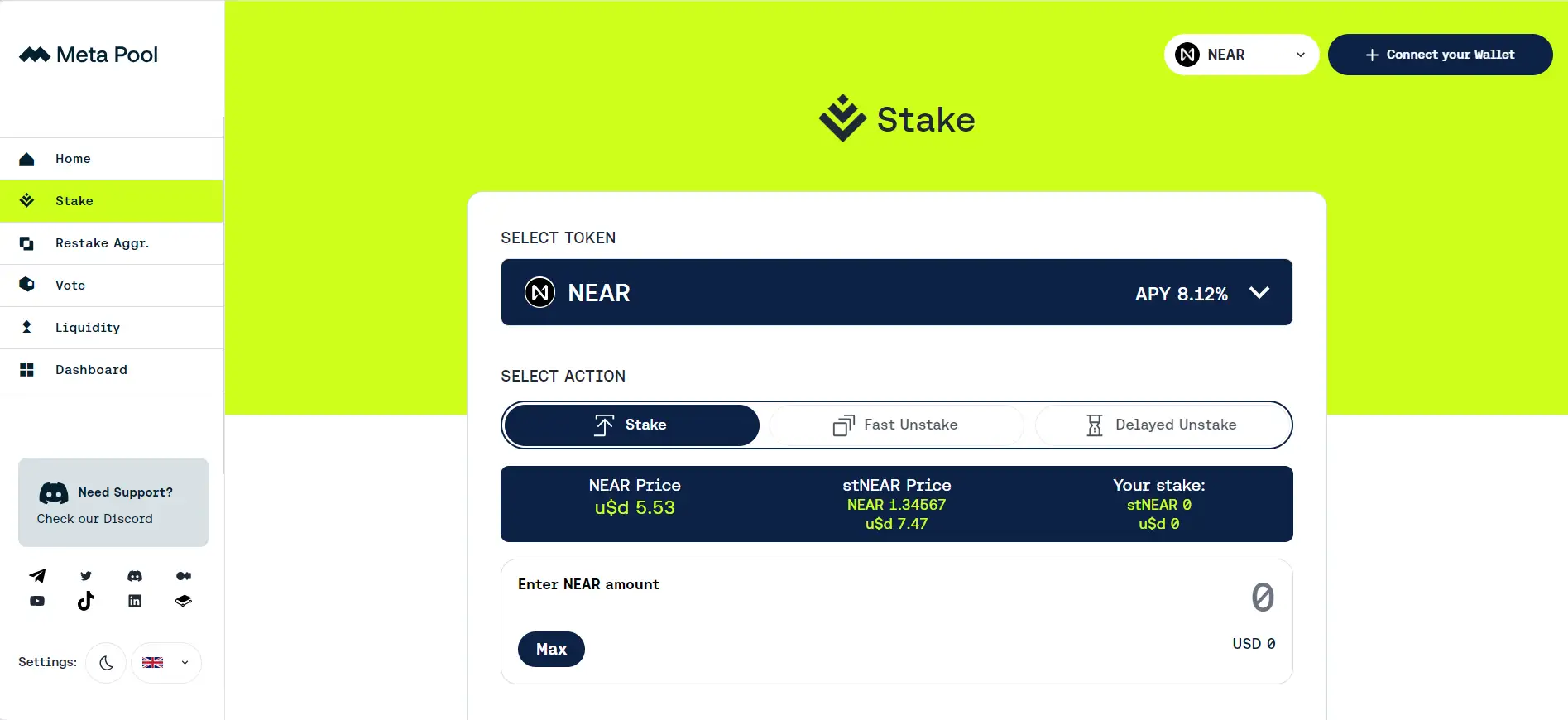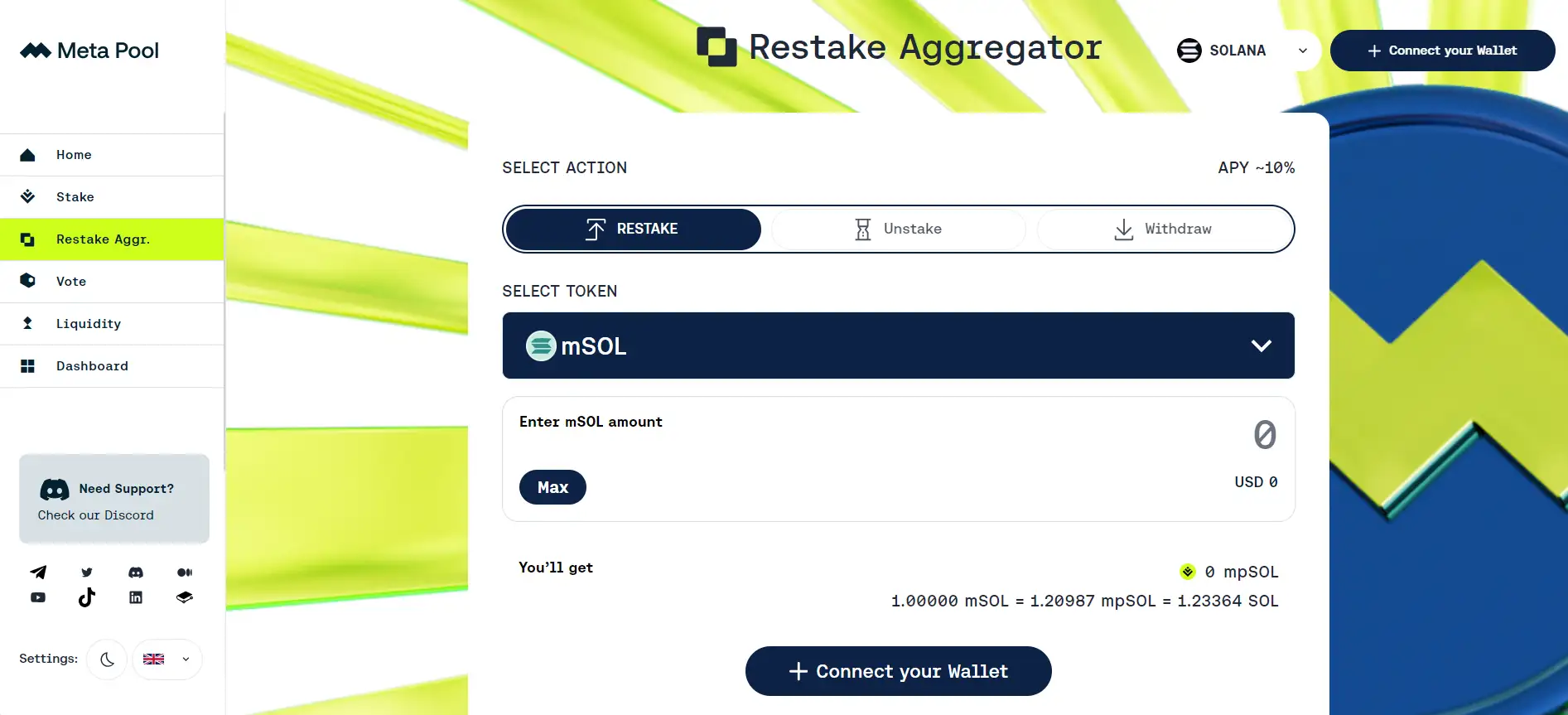About Meta Pool
Meta Pool is a leading liquid staking platform built on the NEAR Protocol, offering users an efficient way to stake their tokens while maintaining liquidity. Unlike traditional staking, where assets are locked and inaccessible, Meta Pool enables users to stake their NEAR tokens and receive stNEAR in return, a tokenized version of their staked assets that can be used across decentralized finance (DeFi) applications.
By using Meta Pool, users benefit from auto-compounded staking rewards while still being able to utilize their assets in lending, liquidity pools, and other DeFi strategies. The platform is designed to enhance network decentralization by distributing stakes among multiple validators, reducing centralization risks. Whether you're an investor seeking passive income or a developer looking to integrate liquid staking solutions, Meta Pool offers a seamless and efficient way to maximize your assets in the NEAR ecosystem.
Meta Pool is revolutionizing staking on NEAR Protocol by providing a liquid staking solution that allows users to earn staking rewards while retaining access to their capital. Traditional staking methods often require users to lock their tokens for a fixed period, limiting their ability to participate in other DeFi activities. With Meta Pool, users stake their NEAR tokens and receive stNEAR, a liquid derivative that can be freely traded or used in various DeFi applications.
One of the standout features of Meta Pool is its automated staking delegation, which distributes stakes across multiple validators. This not only enhances network security but also promotes decentralization by supporting smaller validators. Compared to other staking platforms like Lido and Stader, Meta Pool prioritizes decentralization and governance by allowing the community to participate in decision-making through its Meta Governance model.
For DeFi users, Meta Pool integrates seamlessly with various DeFi protocols, enabling users to utilize their stNEAR tokens for yield farming, lending, and liquidity provision. This increases capital efficiency while ensuring continuous staking rewards. The platform also supports staking for Ethereum through stETH, expanding its reach beyond the NEAR ecosystem.
With features like instant unstaking and governance-driven validator selection, Meta Pool is setting new standards for liquid staking. As DeFi grows, the demand for liquid staking solutions continues to rise, making Meta Pool an essential tool for investors looking to maximize their staking rewards while maintaining liquidity.
Meta Pool provides numerous benefits and features that make it a powerful liquid staking solution:
- Liquid Staking: Users stake NEAR tokens and receive stNEAR, which can be used in DeFi applications without waiting for unstaking periods.
- Auto-Compounded Rewards: Staked assets generate passive income with rewards automatically reinvested for higher yields.
- Decentralization & Security: Stakes are distributed among multiple validators, enhancing network security and reducing centralization risks.
- Instant Unstaking: Users can instantly convert stNEAR back to NEAR through liquidity pools, avoiding long unbonding periods.
- DeFi Integration: stNEAR can be used in lending platforms, liquidity pools, and yield farming for additional rewards.
- Meta Governance: Token holders can vote on validator selection and key protocol upgrades, ensuring community-driven decision-making.
Getting started with Meta Pool is simple and takes just a few steps:
- Visit the official website: Go to Meta Pool to access the staking platform.
- Connect Your Wallet: Use a NEAR-compatible wallet such as Near Wallet or MyNearWallet to connect securely.
- Deposit NEAR Tokens: Transfer NEAR tokens into your staking account.
- Start Staking: Choose the amount of NEAR to stake and receive stNEAR in return.
- Use stNEAR in DeFi: Utilize stNEAR in lending, liquidity pools, or yield farming to maximize your earnings.
- Unstake When Needed: Convert stNEAR back to NEAR instantly using available liquidity pools.
Meta Pool FAQ
When you stake your NEAR tokens with Meta Pool, they are delegated to multiple validators to secure the NEAR Protocol. In return, you receive stNEAR, a liquid token that represents your staked assets and continues to earn staking rewards. Unlike traditional staking, stNEAR can be used across DeFi applications for lending, yield farming, and liquidity provision while your NEAR tokens remain staked and generate passive income.
Meta Pool prevents validator centralization by distributing stakes among a diverse set of validators, prioritizing smaller and emerging ones. This enhances network decentralization and reduces reliance on large validators that could dominate the ecosystem. Additionally, Meta Pool uses a governance-based selection process where users vote on validator delegation, ensuring fair distribution and community-driven decisions.
Yes! Meta Pool allows users to utilize stNEAR in various DeFi protocols while continuing to earn staking rewards. Since stNEAR is a liquid token, it can be used in lending platforms, yield farming, and liquidity pools without needing to unstake NEAR tokens. This provides a dual benefit: earning staking rewards while maximizing additional income through DeFi strategies.
The unstaking process in Meta Pool offers two options: instant unstaking and standard unstaking. Instant unstaking allows users to swap stNEAR for NEAR immediately through liquidity pools. The standard unstaking method follows the NEAR Protocol’s unbonding period of approximately 4-5 days, after which users can withdraw their NEAR tokens. This flexible approach ensures users can choose between immediate liquidity or waiting for a full unstaking cycle.
Meta Pool operates under a Meta Governance model that allows stNEAR holders to participate in protocol decisions. Users can vote on important factors such as validator selection, reward distribution, and network upgrades. By ensuring a decentralized governance structure, Meta Pool empowers its community to shape the platform’s future, making it a transparent and user-driven staking solution.
You Might Also Like












